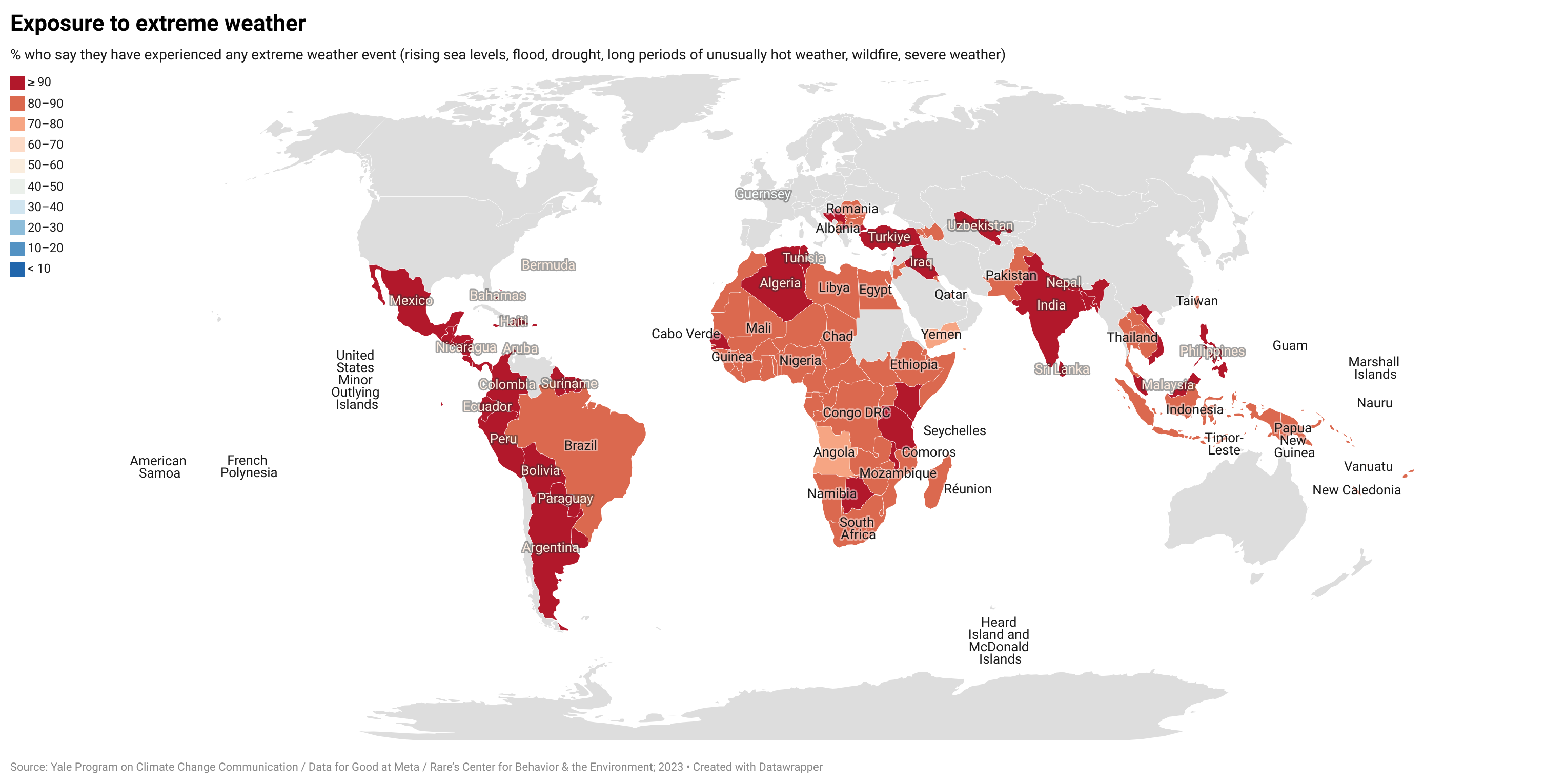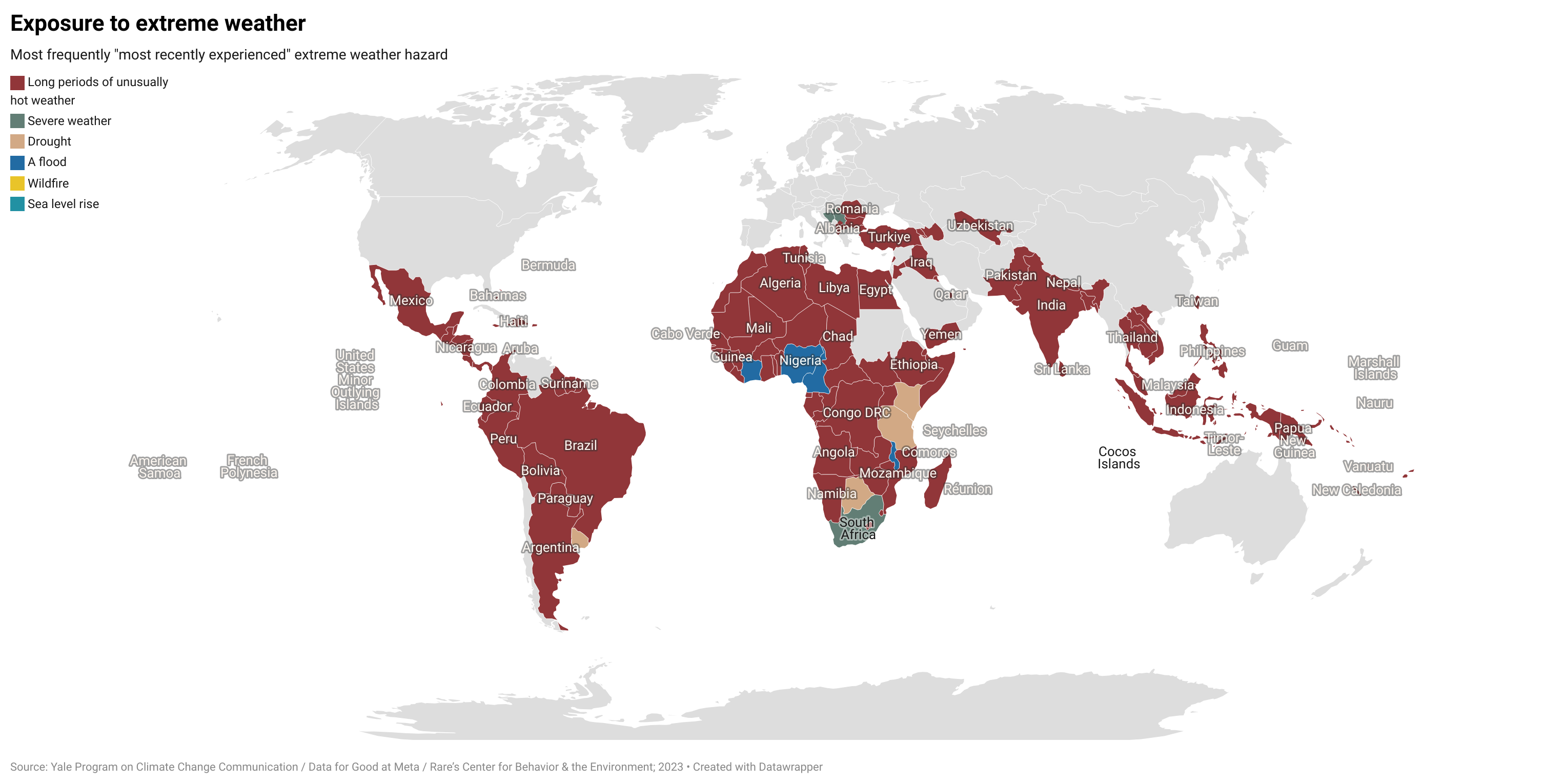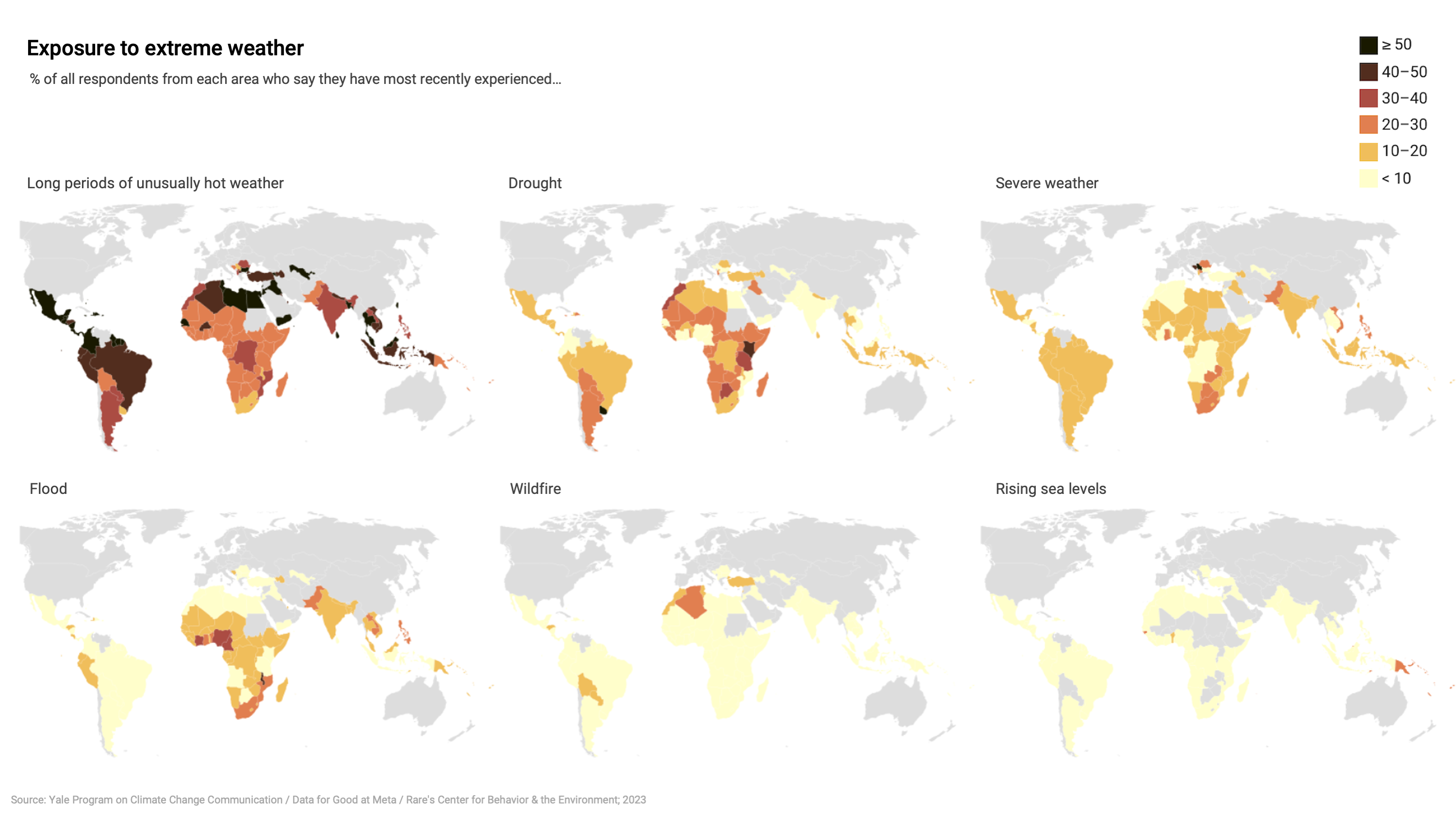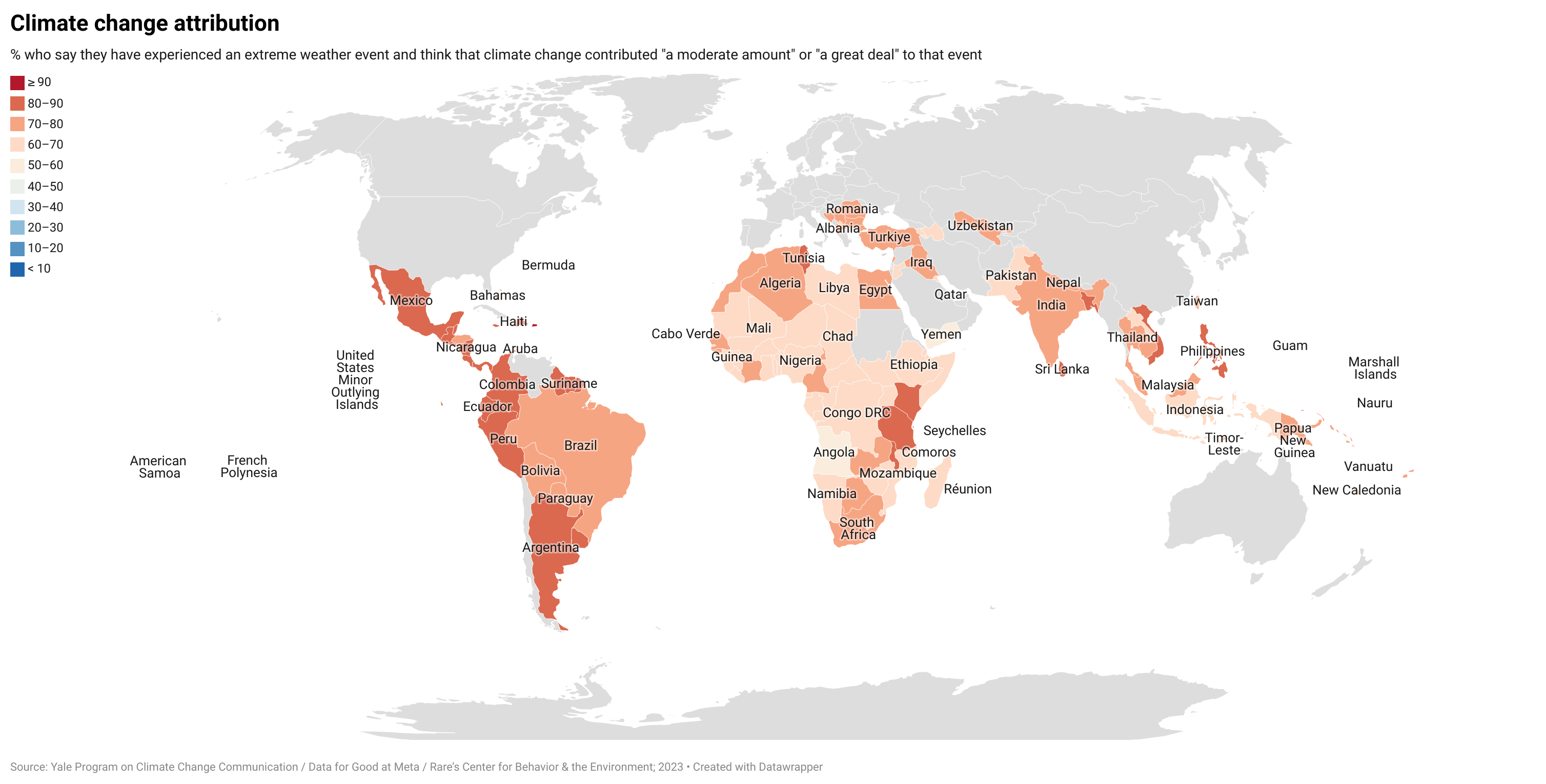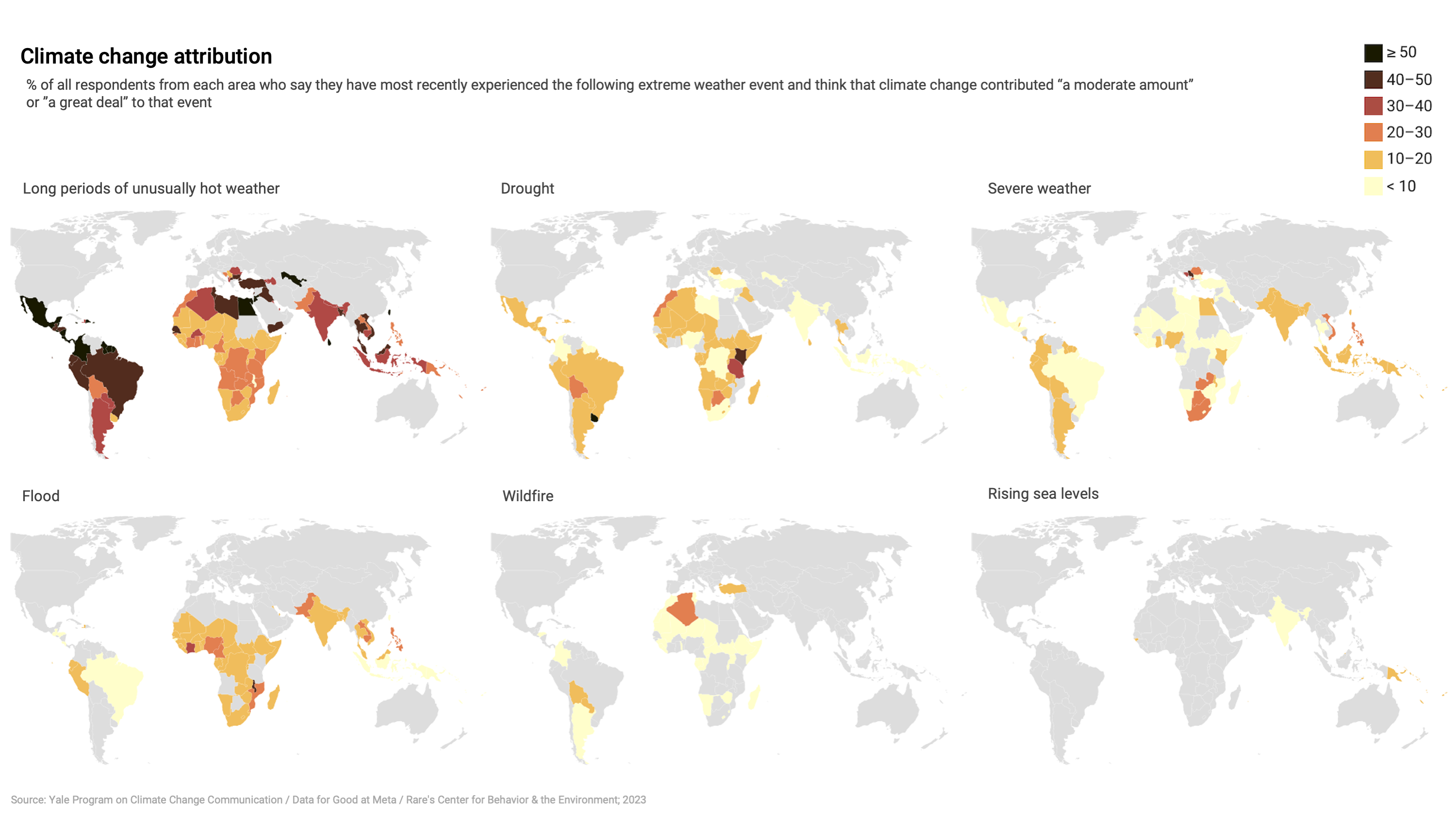Report · Mar 26, 2024
International Public Opinion on Climate Change: Extreme Weather and Vulnerability, 2023
By Anthony Leiserowitz, Marija Verner, Emily Goddard, Emily Wood, Jennifer Carman, Leah Ndumi Kioko, Natalia Ordaz Reynoso, Erik Thulin, Seth Rosenthal, Jennifer Marlon and Nicole Buttermore
Filed under: Climate Impacts and Beliefs & Attitudes
1. Extreme Weather and Climate Change
1.1. Large majorities in every country and territory surveyed said they have experienced an extreme weather event.
A majority of respondents (more than 50%) in all 73 countries, territories, and geographic areas surveyed said they have experienced at least one extreme weather event or hazard (such as rising sea levels, flood, drought, long periods of unusually hot weather, wildfire, and severe weather).
Respondents in Puerto Rico and Uruguay (both 98%), as well as Costa Rica, Dominican Republic, and El Salvador (all 96%) were the most likely to say they had experienced an extreme weather event or hazard. Respondents in Congo DRC (80%), Yemen (78%), and Angola (76%) were the least likely to say so.
1.2. Nearly everywhere, respondents were most likely to say they had experienced long periods of unusually hot weather.
Respondents in nearly all areas were more likely to say they had recently experienced long periods of unusually hot weather than any other hazard. Respondents selected this response the most often in 62 out of 73 areas.
Respondents in four areas (Cameroon, Côte d’Ivoire, Malawi, and Nigeria) were most likely to say they had most recently experienced a flood. Respondents in four areas (Botswana, Kenya, Tanzania, and Uruguay) were most likely to say they had most recently experienced drought, and respondents in three areas (Bosnia and Herzegovina, Serbia, and South Africa) were most likely to say they had most recently experienced severe weather.
As noted above, respondents in 62 out of 73 areas surveyed were most likely to say they had experienced long periods of unusually hot weather, with outright majorities in 27 areas saying so (see Appendix II for larger maps by hazard). Respondents in Uzbekistan (77%), El Salvador (69%), and Puerto Rico (68%) were the most likely to say they had most recently experienced long periods of unusually hot weather.
In comparison, a majority in only one area, Uruguay (70%), said they had most recently experienced drought, although many in Kenya (45%) and Morocco (33%) also said so. Similarly, a majority in only one area, Serbia (57%), said they had most recently experienced severe weather, though many respondents in other Balkan nations also said so (Bosnia and Herzegovina, 44%; Romania, 28%).
Floods, wildfires, and rising sea levels were also noted as the most recently experienced hazard, but to a lesser extent. Respondents in Malawi (49%), Côte d’Ivoire (39%), and Cameroon (33%) were the most likely to say they had most recently experienced a flood. Respondents in Algeria (28%), Bolivia (18%), and Turkey (15%) were the most likely to say they had experienced a wildfire. Finally, respondents in the Asian and Pacific Islands group (22%), Benin (11%), and Ghana (9%) were the most likely to say they had experienced rising sea levels.
Note: Landlocked countries are excluded from the map of perceived sea-level-rise exposure.
1.3. Majorities in every area said they have experienced an extreme weather event and attributed that event to climate change.
After selecting which hazard they had experienced most recently, respondents were asked how much they thought climate change contributed to that hazard.As described in our earlier report about this survey, “International Public Opinion on Climate Change, 2023,” many respondents said at first that they knew little to nothing about climate change. However, the survey questions included in the current report were asked after all respondents were provided with a one-sentence description of climate change, which informed their subsequent responses. Majorities of respondents in all 73 areas surveyed said both that they have experienced at least one extreme weather event or hazard (such as rising sea levels, flood, drought, long periods of unusually hot weather, wildfire, and severe weather; refer to Section 1.1.) and that they thought climate change contributed either “a great deal” or “a moderate amount” to that hazard.
Respondents in Puerto Rico (91%), Costa Rica (89%), and Uruguay, El Salvador, and Panama (all 87%) were the most likely to say they had experienced an extreme weather event and to attribute that event to climate change. Respondents in Libya (61%), Angola (59%), and Yemen (56%) were the least likely to say so.
As described in Section 1.2., majorities of respondents in many surveyed areas said the hazard they had most recently experienced was long periods of unusually hot weather. In line with that, large percentages of respondents in many areas both said that they experienced this hazard and attributed it to climate change. Specifically, respondents in El Salvador, Puerto Rico, and Uzbekistan (all 65%) were most likely to say that they had most recently experienced long periods of extremely hot weather and to say that climate change contributed “a great deal” or “a moderate amount” to it (see Appendix III for larger maps by hazard).Countries and territories were included in these maps if they met two criteria: (a) at least 5% of total sample size for that country or territory selected the hazard, and (b) this included at least 100 total respondents. Bar charts with detailed attribution results for each hazard in all countries and territories are presented in Appendix V.
Uruguay (63%), Kenya (41%), and Tanzania (30%) had the largest percentages of respondents who said they had most recently experienced a drought and that climate change contributed “a great deal” or “a moderate amount” to it.
Serbia (48%), Bosnia and Herzegovina (36%), and Romania (25%) had the largest percentages of respondents who said they had most recently experienced severe weather and that climate change contributed “a great deal” or “a moderate amount” to it.
Malawi (43%), Côte d’Ivoire (33%), and Cameroon (28%) had the largest percentages of respondents who said they had most recently experienced a flood and that climate change contributed “a great deal” or “a moderate amount” to it.
Algeria (21%), Bolivia (12%), and Turkey (12%) had the largest percentages of respondents who said they had most recently experienced a wildfire and that climate change contributed “a great deal” or “a moderate amount” to it.
The Asian and Pacific Islands (19%) and India (5%) had the largest percentages of respondents who said they had most recently experienced rising sea levels and that climate change contributed “a great deal” or “a moderate amount” to it.
